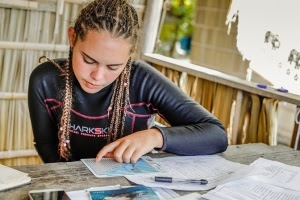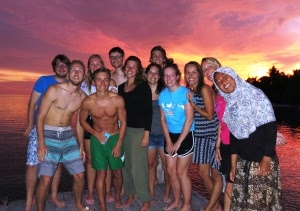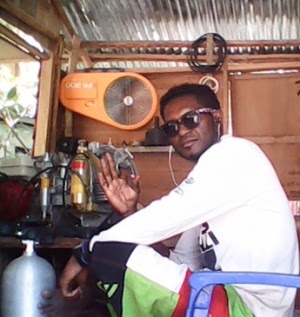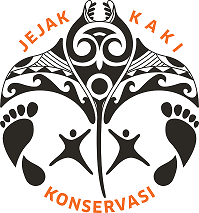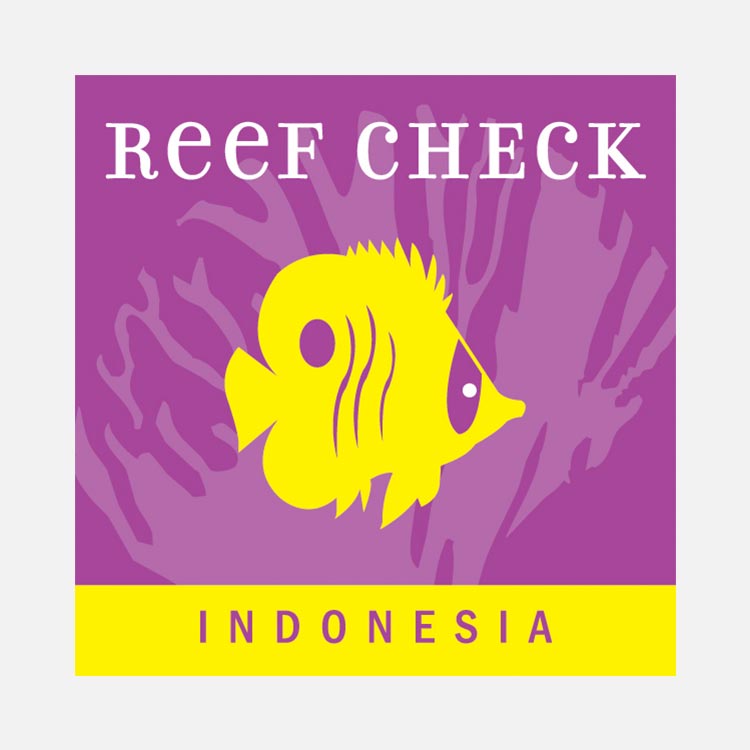Barefoot Conservation Science Report 2024
Introduction:
Barefoot Conservation is an Indonesian registered NGO (Yayasan Konservasi Jejak Kaki Indonesia: AHU-0004531.AH.01.04. Tahun 2018) working to conserve the unrivalled marine life of Raja Ampat, through monitoring, research and science training of the local community. Barefoot has been running since 2016 and has been collecting data on reef health, manta populations, marine debris and crown of thorns starfish for several years, providing invaluable long-term datasets of the ecosystem over time. Our scientific output is constantly evolving and expanding and we now have 11 science projects running in parallel. This report provides an update on the progress of 7 of our major science projects in 2025.
Our Science team at Barefoot currently consists of Project Scientist Reyhan Arifin (Jenderal Soedirman University), Project Scientist Mathilda Bates (James Cook University), Project Scientist Nikolai Madland Shorter (University of Cambridge), Science Officer Septya Putri (Jenderal Soedirman University) and the Head of Science Josie Chandler (James Cook University) who is working remotely from Australia. Our Head of Operations (Iris Uijttewaal), Dive Manager (Matt Perrodou), and Divemasters (Reven and Markus) are also heavily involved in the science projects. Other scientists who have been involved with the science at Barefoot during 2024 but are no longer working us are: Lena Pollett (Plymouth University), Max Kimble (Plymouth University), Corey Cathcart (Bournemouth University), Issy Inman (Swansea University). We also thank Erika Gress (James Cook University) for her involvement with Barefoot Science and dedication to the reefs of Raja Ampat during 2024.
Last year in 2023 we commenced new projects, most notably setting up a Coral Ecology and Bleaching Project and extensive cyanobacteria monitoring. This year in 2024 we have built upon these projects with the addition of installing temperature loggers and setting up new monitoring techniques such as large-scale photogrammetry, we have also started employing AI technologies into some of our data analysis (ReefCloud). In addition to Coral Bleaching Project expansion this year we have also included two new monitoring projects – monitoring prevalence of coral-killing sponge (Terpios hoshinota) and monitoring coral spawning. This year has also seen new collaborations commence which we hope to build on further in 2025. All of these projects will be outlined in more detail within this report, including background, progress and goals for 2025.
We have continued to progress with the long-term data collection of Reef Check, hitting our monitoring targets each quarter and adding bonus sites to our data bank. We have also contributed to ongoing data collection within a wide variety of projects including marine debris, manta rays, black corals, crown-of-thorns starfish and more. However, with the emerging threats of marine heatwaves and deteriorating water quality becoming more and more problematic for this region, we have put the majority of our efforts into two focal projects this year: 1) Coral Ecology and Bleaching Project and the 2) Water Quality and Cyanobacteria Monitoring project.
One of the key projects we have been working towards this year has been monitoring the presence of cyanobacteria & macroalgae in the Dampier Strait, which we have recognised to be increasing dramatically in recent years. Rapid growth of cyanobacteria and macroalgae is an issue linked to nutrient pollution which is known to have caused significant irreversible damage to coral ecosystems in the Caribbean and other parts of the Indo-Pacific. This year we contracted water testing of key water quality parameters and have highlighted our concerns of poor water quality to BLUD UPTD during meetings and a separate water quality report.
Unfortunately, in recent months we have witnessed a severe bleaching event unfold in the western side of the Dampier Strait, starting in November 2024. It was heartbreaking to observe mass bleaching at such magnificent reefs and unfortunately we have already witnessed some mortality of corals as a result of this event. In 2023 we had established a comprehensive coral bleaching monitoring programme for Raja Ampat, coordinated with NOAA Coral Reef Watch collaborators, and so we have been able to capture the event unfold and we continue to collect unprecedented data on this event into 2025. We continue to work with provincial government and other stakeholders on the status of Raja Ampat reefs and strive to inform management decisions in the region.
All of the projects currently running at Barefoot Conservation, collect observational data only, and the results of the research remain within Indonesia. Correct permissions were sought from both Chief of Arborek Village, Bapa Juan Mambrasar , and Head of BLUD, Pak Safry, before commencing any of the projects mentioned in this report.
For any questions regarding the data, findings or projects mentioned in this report, please contact our Head of Science, Josie Chandler, via:-
REPORTS (click links below)
Barefoot Conservation Science Progress Report 2024-2025 (English)

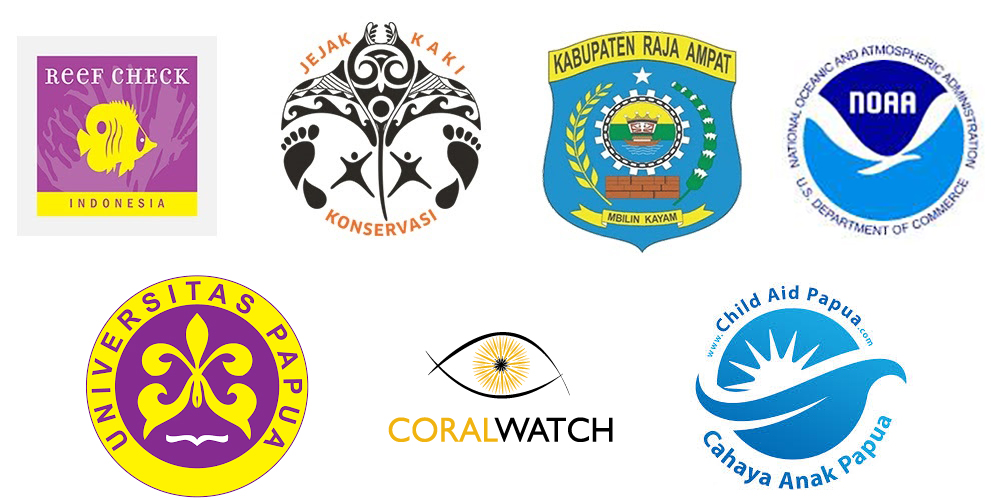
Barefoot Conservation Science Report 2023
Introduction:
Barefoot Conservation is an Indonesian Yayasan (Yayasan Konservasi Jejak Kaki Indonesia: AHU-0004531.AH.01.04. Tahun 2018) working to conserve the unrivalled marine life of Raja Ampat, through monitoring, research and science training of the local community.
Barefoot has been running since 2016 and has been collecting data on reef health, manta populations, marine debris and crown of thorns starfish for several years, providing invaluable long-term datasets of the ecosystem over time.
In 2022 we commenced several new projects, most notably a reef restoration project, but also a black corals project, cyanobacteria monitoring and anchor damage monitoring. This year, we have continued improving and expanding our scientific output with the addition of a Coral Ecology and Coral bleaching monitoring project.
All of these projects will be outlined in more detail within the report below, including background, progress and goals for 2024.
Our Science team at Barefoot currently consists of Lead Scientist Lena Pollett (Plymouth University), Project Scientist Reyhan Arifin (Jenderal Soedirman University), Science Interns Max Kimble (Plymouth University), Corey Cathcart (Bournemouth University) and the Head of Science Josie Chandler (James Cook University) who is working remotely from Australia. Our Head of Operations (Iris Uijttewaal), Dive Manager (Matt Perrodou), and Divemasters (Ferry and Markus) are also heavily involved in the science projects.
This year we focused on both old and new projects. We have continued to progress with the long-term data collection of Reef Check, hitting our monitoring targets each quarter and adding bonus sites to our data bank. With the new projects, we have refined methodology & began using new software to analyse these exciting datasets. Furthermore, with the threat of a bleaching event in Raja Ampat at the end of 2023 we commenced a monitoring project to track the reef status during the anticipated warming.
One of the key projects we have been working towards this year has been monitoring the presence of cyanobacteria & macroalgae in the Dampier Strait, which we have recognised to be increasing dramatically in recent years. Rapid growth of cyanobacteria and macroalgae is an issue which has caused significant irreversible damage to coral ecosystems in the Caribbean and other parts of the Indo-Pacific. Therefore, we are currently working with the government to investigate this environmental change and exploring potential solutions.
This year has also seen new collaborations commence which we hope to build on further in 2024. This report provides an update on the progress of our major science projects in 2023.
All of the projects currently running at Barefoot Conservation, collect observational data only, and the results of the research remain within Indonesia. Correct permissions were sought from both Chief of Arborek Village, Bapa Juan Mambrasar , and Head of BLUD, Pak Safry, before commencing any of the projects mentioned in this report.
For any questions regarding the data, findings or projects mentioned in this report, please contact our Head of Science, Josie Chandler, via:-
REPORTS (click links below)
Barefoot Conservation Science Progress Report 2023-2024 (English)
Barefoot Conservation Science Progress Report 2023-2024 (Bahasa Indonesia)
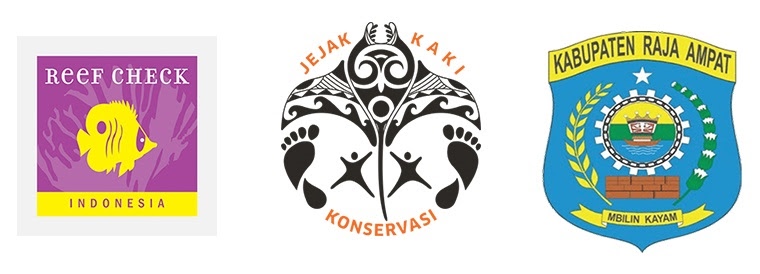
This start date is for any volunteers who have never scuba dived before or are at Open Water qualified diver level (PADI or other organisation)
This start date is for any volunteers who are already a qualified diver up to advanced level (PADI or other organisation)
This start date is for any volunteers who have never scuba dived before or are at Open Water qualified diver level (PADI or other organisation)
This start date is for any volunteers who are already a qualified diver up to advanced level (PADI or other organisation)
This start date is for any volunteers who have never scuba dived before or are at Open Water qualified diver level (PADI or other organisation)
This start date is for any volunteers who are already a qualified diver up to advanced level (PADI or other organisation)
This start date is for any volunteers who have never scuba dived before or are at Open Water qualified diver level (PADI or other organisation)
This start date is for any volunteers who are already a qualified diver up to advanced level (PADI or other organisation)
This start date is for any volunteers who have never scuba dived before or are at Open Water qualified diver level (PADI or other organisation)
This start date is for any volunteers who are already a qualified diver up to advanced level (PADI or other organisation)
This start date is for any volunteers who have never scuba dived before or are at Open Water qualified diver level (PADI or other organisation)
This start date is for any volunteers who are already a qualified diver up to advanced level (PADI or other organisation)
This start date is for any volunteers who have never scuba dived before or are at Open Water qualified diver level (PADI or other organisation)
This start date is for any volunteers who are already a qualified diver up to advanced level (PADI or other organisation)
This start date is for any volunteers who have never scuba dived before or are at Open Water qualified diver level (PADI or other organisation)
This start date is for any volunteers who are already a qualified diver up to advanced level (PADI or other organisation)
This start date is for any volunteers who have never scuba dived before or are at Open Water qualified diver level (PADI or other organisation)
This start date is for any volunteers who are already a qualified diver up to advanced level (PADI or other organisation)
This start date is for any volunteers who have never scuba dived before or are at Open Water qualified diver level (PADI or other organisation)
This start date is for any volunteers who are already a qualified diver up to advanced level (PADI or other organisation)
This start date is for any volunteers who have never scuba dived before or are at Open Water qualified diver level (PADI or other organisation)
This start date is for any volunteers who are already a qualified diver up to advanced level (PADI or other organisation)
This start date is for any volunteers who have never scuba dived before or are at Open Water qualified diver level (PADI or other organisation)
Barefoot Conservation Science Report 2022
Introduction:
Barefoot Conservation is an Indonesian Yayasan (Yayasan Konservasi Jejak Kaki Indonesia: AHU-0004531.AH.01.04. Tahun 2018) working to conserve the unrivalled marine life of Raja Ampat, through monitoring, research and science training of the local community. Barefoot has been running since 2012 and has been collecting data on reef health, manta populations, marine debris and crown of thorns starfish for several years, providing invaluable long-term datasets of the ecosystem over time.
Additionally, this year in 2022, several new projects have commenced, most notably a reef restoration project, but also a black corals project, cyanobacteria monitoring and anchor damage monitoring. All of these projects will be outlined in more detail below, including background, progress and goals for 2023.
Our Science team at Barefoot currently consists of three Indonesian marine science graduates: Afryan Maris Pappang Simon (Hasanuddin University of Makassar), Victor Hendrico (IPB University), Felicita Laura Annemarie (Victoria University of Wellington), a manta scientist from Plymouth University (UK) Lena Pollet, and the Head of Science Josie Chandler (James Cook University) who is working remotely from Australia.
Our Project Manager, dive instructor, divemasters and doctor are also heavily involved in the science projects.
Despite the struggles of Covid that affected our monitoring in 2020/2021, we have achieved a lot this year both within science and also community outreach and training. We reached our survey goals for Reef Check and have seen some promising results in the first year of our coral restoration project. Importantly, we have built a strong foundation for an even stronger 2023, with lots of exciting collaborations and several new projects due to commence in January 2023. This report provides an update on the progress of our major science projects in 2022.
All of the projects currently running at Barefoot Conservation, collect observational data only, and the results of the research remain within Indonesia. Correct permissions were sought from both Chief of Arborek Village, Bapa Juan Mambrasar , and Head of BLUD, Pak Safry, before commencing any of the projects mentioned in this report.
For any questions regarding the data, findings or projects mentioned in this report, please contact our Head of Science, Josie Chandler, via:-
REPORTS (click links below)
Barefoot Conservation Science Progress Report 2022-2023 (English)
Barefoot Conservation Science Progress Report 2022-2023 (Bahasa Indonesia)

Barefoot Conservation Liveaboard
Barefoot Conservation are now able to offer past, present and future volunteers/guests an amazing opportunity to join our liveaboard research expeditions in Raja Ampats Central, North and South locations.
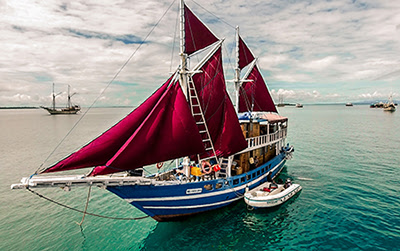
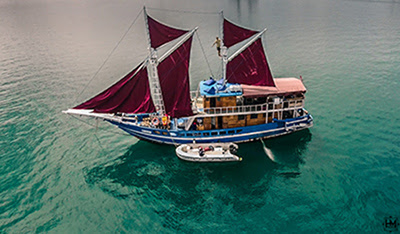
Ahoy!
Welcome aboard the Ratu Laut liveaboard!
The Ratu Laut, one of the legendary Indonesian Phinisi boats, has been sailing the seas of Indonesia since 2008 as a surfing charter boat. In 2016 she was extensively renovated, equipped with modern facilities, a new engine and safety equipment to transform her into a scuba diving liveaboard boat. There are 4 cabins comfortable for up to 12 people. Two smaller cabins with two bunk beds in each cabin and we have two cabins with 4 bunk beds one of them is on the main deck. A cozy dining space and spaces to relax on deck provide an exciting liveaboard experience at an affordable price!
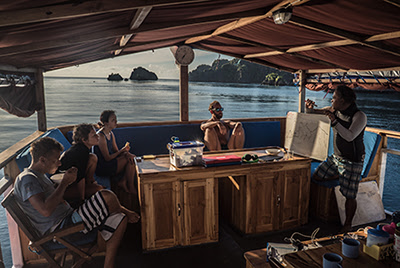

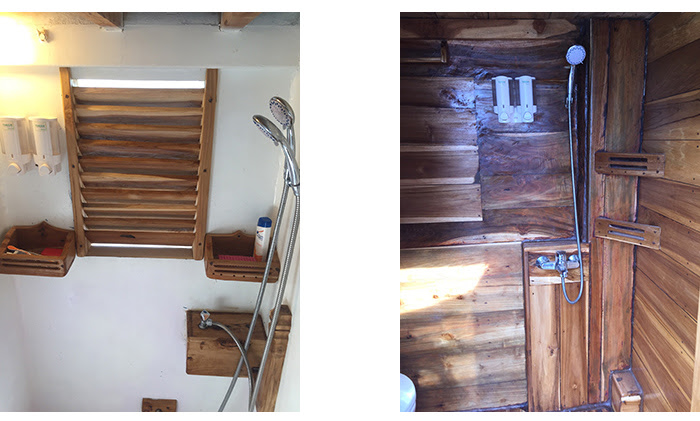
Some ex-volunteers and staff heading out to Daves Bar for a nice BBQ on a deserted beach.....what ever happened to Daves bar...anyone???.
I had an amazing experience during my 8 weeks of volunteering with Barefoot Conservation in Raja Ampat. Barefoot gave me the opportunity to enjoy the local communities culture, teach local children english, through the marine science and survey work I learned a substantial amount about these bio diverse ecosystems while contributing to the conservation of them, and i was also able to dive in some of the most pristine reefs in the world, while living in paradise.
Barefoot Conservation's Mission & Goals
Mission:
Barefoot Conservation's mission is to work in partnership with the Raja Ampat local government, local Papuan Communities and stakeholders, to protect the coral reefs of Raja Ampat and the communities that rely on them.
This partnership is bonded by a willingness to make a real difference, and the understanding that research, survey dives and Marine Protected Areas cannot work unless accompanied by education and the sustained alleviation of poverty.
Our projects are designed to work at a grass roots level, thus making a real difference to real people, and a difference that each volunteer can see and be a part of.
Goals:
- To conduct marine underwater surveys using the Reef Check methodology, collecting data, for the use in advising local government, local communities and other NGO partners, on the health of coral reefs and marine life in Marine Protected Areas (MPA's).
- Produce a local Manta Ray Identification (ID) database, through underwater manta ray surveys. Sharing collected data with local government and NGO partners.
- Monitor the number of Crown of Thorns starfish (COTs) in the region, undertaking COTs removal dives during large outbreaks.
- Undertake educational programmes on environmental issues, sustainable fishing techniques (if necessary) and the economic benefits of MPA's.
- Increase quality of life and alleviate poverty in local communities, through our community projects - Education, Waste Management, Health Clinics, Family Planning, Dental Hygiene, Renewable Energy.
- Encourage entrepreneurial attitudes to deter from unsustainable destructive activities like Shark finning, Manta Ray gill raking or dynamite fishing.

Barefoot Conservation's Waste Management Programme
Barefoot Conservation Beach Clean- Maybe Less Glamorous but Still Incredible Rewarding
One of the greatest threats facing our oceans today is plastic waste, and it seems that there are few, if any, places left in the world that are unaffected by this issue. A major problem is with plastic wastes such as water bottles, sweet wrappers and plastic bags. They can take decades to degrade and even after this point they can remain within ecosystems as Nano-Plastics. Although beach clean ups may be less glamorous than releasing baby turtles, science diving and manta ray spotting, they are just as important, if not more important than all of these other activities.
Many marine creatures are often seen taking bites of plastic, before realizing what it is and spitting it out. Some however do not realize until it’s to late, this is a particular problem for many sea turtles such as the Leatherback who mistake plastic for one of their food sources jellyfish. Simply collecting the waste that washes up on the beach can have a huge impact on reef ecosystems, helping to prevent coral damage, ingestion by marine creatures and the release of harmful chemicals once the trash eventually starts to degrade.
Volunteers at Barefoot Conservation are asked to help out with beach clean-ups as often as possible. This not only sets a great example to the local community, but also allows participants to see the good they are doing by physically removing rubbish from the environment.

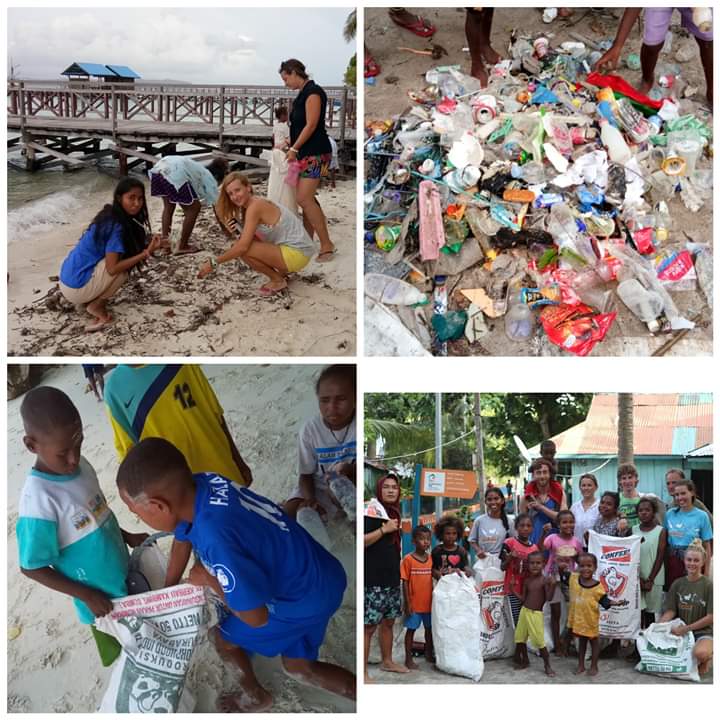

Barefoot Conservation's Education Programme
English Lessons
Hello, Mister! How are you?!!!
That is what came out of a young Papuan boy’s mouth two days after his first English lesson with Barefoot Conservation. Sitting in his father’s boat during a slow ride on a fine Saturday afternoon, the boy waved and shouted the same greeting over and over again to BC staff. If you were his teacher, how would you feel? Happy? Of course. Proud? Most definitely.
One of BC’s community work programs is to run English courses both for children and adults. Taught in a friendly, easy-going environment, we aim to improve the Papuan children's English skills to help their chances of qualifying for higher education. And the adults to communicate better with the tourists they encounter through their local businesses (village shop, homestays, snorkeling tours etc..). Classes are run separately between children and adult and they include writing, listening, reading, and speaking. To make it easy to grasp, examples and exercises are made such that they relate to every-day life in Raja Ampat.
Our staff, Desiree, has performed two children sessions on Alphabets, Numbers 0-10, and Greetings. How many students would you expect to attend the first session? 10? 20 maximum? Exactly her thought but surprise, surprise! Almost 30 students showed up ranging from Year 1 to Year 7. All in one class. Worse, there were only enough notes for 20 students which in the end had to be shared between them (after all sharing is an act of love, isn’t it?). They were shy at first and after a quick Hangman session, Desiree won their hearts. Never in her life has she had students learning with such excitement. After nearly 1.5 hours of teaching, she almost lost her voice so that was the end of Session 1. Judging from how the students responded to the lesson, they appeared to be more excited in English in Maths (no offense to all Maths teachers out there).
Moving on to the second session three days after the first, Desiree did a quick review on the alphabets and numbers with a game. She wrote random letter-number combinations on the blackboard such as AB78, H2LK, etc. She then divided the class into two groups and each team pointed a member to race against the other team member to the blackboard and find the combination Desiree previously spelled. So, there it was. The battle between the Lion and the Dolphin began (of course our beloved, aquatic mammal won!) The game was followed by listening, reading, and speaking exercises. The students were actively involved in all parts of the course. Like the first session, the second went very well and again, Desiree almost lost her voice at the end of the day. No pain, no gain, right?
Having students answering questions so loud and clear all together is an indication they want to learn and it gives us hope that these young students are capable of so much more. We believe if they are given the right educational support e.g. improved facilities and skillful teachers, they will be able to compete with other students from other states in Indonesia.
Well done, kids! See you soon for session 3.
Math Lessons
When Barefoot undertook its first surveys of the Yanbuba village community, we surveyed various members of the community across a broad demographic. It soon became apparent from the results, that a good education for the children was a very high priority for the community. So it came as no surprise to us that after English lessons, other school subjects were high up on the priority when we analysed the results.
Not long after our surveys the Kalibia team came to visit Yanbuba village to run a conservation education day. The Kalibia team (who were sponsored by Conservation International) sail around various villages through out Raja Ampat educating the children about conservation and the delicate coral reefs that live on their doorstep.
Barefoot Conservation was invited by the Kalibia team to join them for the day to help out with the programme. It was during some of the fun games that Desiree one of our community staff team asked some of the kids how many of them were left in their team now that 3 had join another team. Desiree was shocked at just how many of the children struggled with this simple question. It became obvious to us that Barefoot would need to expanded its education programme to include Maths as well as English lessons.
After a meeting with the Head of Schools for the region, Barefoot was given permission to run some classes during school time, the first of which was year 6 maths. We were asked by the Head of Schools and the local school teachers in Yanbuba village if we could help out with year 6 maths first, as they will be taking their national exams in May.
Desiree our Community Manager got straight to work burning the midnight oil to produce lesson plans for the year 6 classes. Fractions were her first port of call, as this was the current level the year 6 children should have been at from looking at the school syllabus. Desiree soon found herself going back over multiplication and division with the children as they struggled with these parts to solve the fraction equations she had set them on the board.

Desiree now knew she had her work cut out for her, but we had made a start and we had started to make a difference, and although we all knew it was a long road ahead, we were all pleased to be making a difference to these children's education.
When you join a Barefoot Conservation expedition you will help out with this rewarding education programme, your expedition fee goes towards helping these children get a better education and providing new school materials!
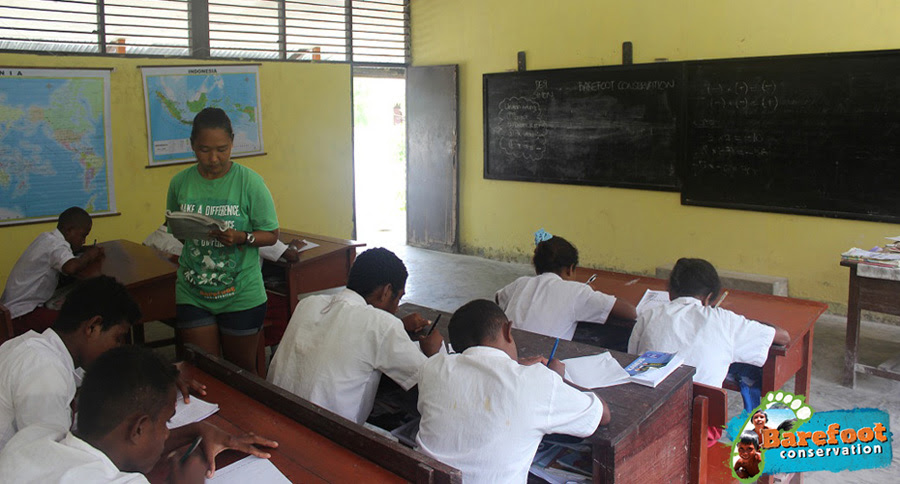
Test out your old fraction knowledge and see if you could solve the equation in the picture below (no calculators allowed as the Yanbuba school kids dont have them!): -

Answer is below, no cheating now.....
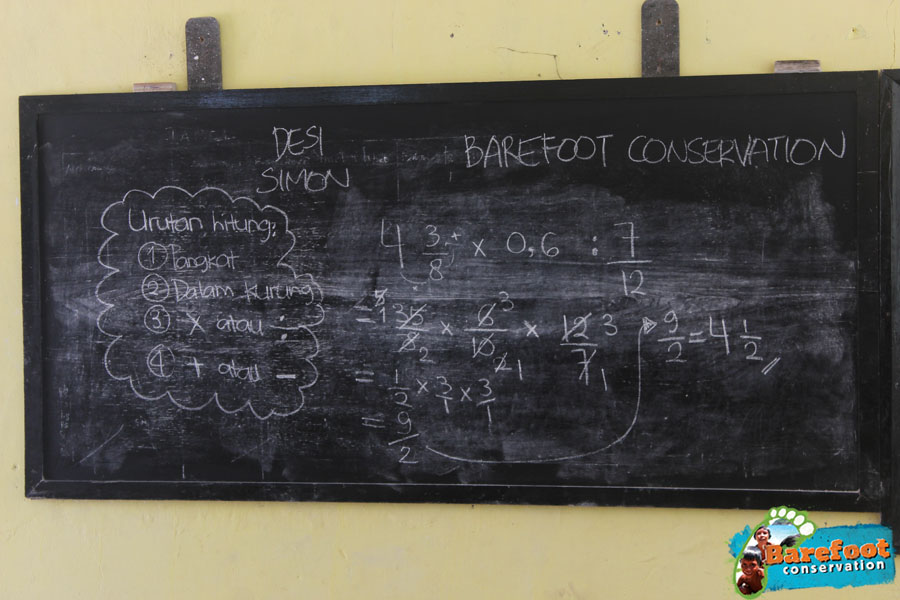
Well done to all of you that got it correct! Ans= 4.5
CREATURE WATCH
Ornate Wobbegon - Orectolobus ornatus
Kingdom: Animalia Phylum: Chordata Class: Chondrichthyes Sub-class: Elasmobranchii Order: Orectolobiformes Family: Orectolobidae Genus: Orectolobus Species: Orectolobus ornatus
Ornate Wobbegon are commonly found on coral reefs but are often over looked by divers because of their highly camouflaged bodies. They are predominantly ambush predators who lye in wait for their pray, so diver’s who aren’t paying attention to where their going had better watch out! Some species of wobbegon have been observed sneaking up on their pray from a distance. They are able to reach a maximum length of approximately 3 meters and are ovoviviparous meaning that eggs are retained within the female shark in a brood chamber where the embryo is able to develop in relative safety feeding on a yolk sac.

Spot the Seahorse
Denise's Pygmy Seahorse - Hippocamus denise
Kingdom: Animalia Phylum: Chordata Class: Actinopterygii Order: Gasterosteiformes Family: Syngnathidae Genus: Hippocampus Species: Hippocampus denise
Most likely due to its tiny size Pygmy seahorses have only been discovered within the last decade and very little is know about them still. Hippocampus denise is one of the smallest species measuring less than 2 cm in height and are thought to only live on certain gorgonian corals namely; Annella reticulata, Muricella and Echinogorgia, at depths ranging from 13–90 m (IUCN Red List). Current thinking suggests that they feed on the tissue of the gorgonian that they live on or on plankton brought to them on currents. Like other seahorses Pygmies are monogamous and ovoviviparous, where the eggs are carried with in the brooding cavity of the male while the female begins a new cycle.

Blacktip Reef Shark- Carcharhinus melanopterus
Kingdom: Animalia Phylum: Chordata Class: Chondrichthyes Sub-class: Elasmobranchii Order: Carcharhiniformes Family: Carcharhinidae Genus: Carcharhinus Species: Carcharhinus melanopterus
A common occurrence around Barefoot Conservation's house reefs, blacktip reef sharks are usually seen gliding in to the distance by survey teams and on occasion have been know to come in for a closer look for a few lucky divers. Blacktips are considered small as far as sharks go reaching up to 1.8 meters in length. Their most distinctive features are the “black tips” on all of their fins, and are one of three sharks commonly seen in the Indo-Pacific, the other two being the grey reef shark, Carcharhinus amblyrhynchos and whitetip reef shark, Triaenodon obesus. Blacktip reef sharks like most species of sharks are hugely vulnerable to depletion because of their long gestation periods and small litter sizes. Typically they mature at eight years for a male and nine for a female who will gestate for about 10 months with a litter size of two to four pups.

Manta Ray Research Programme
The team at Jejak Kaki Konservasi are running a manta ray ID program in Raja Ampat, building up a database on these amazing creatures. Volunteers joining an expedition are highly likely to see manta rays while diving in the area. A common cleaning station for Manta Rays is a short boat trip away, dubbed “Manta Sandy” this is one of the observation sites for our monitoring program.
Volunteers wishing to participate in the program are trained by Jejak Kaki Konservasi Science Officers to recognize key characteristics, markings and behaviors of the gentle giants as well as their ecology, biology and conservation. Mantas are commonly sighted while out on other dives and have even been know to sneak up on unsuspecting project scientists! The manta in the picture below was estimated to have a wing span of 4 to 5 meters and kept volunteers and staff company on their safety stop on a Saturday fun dive at “Blue Magic” (not bad company!)
Mantas Rays, being the largest species of all Rays, are threatened with Extinction. With slow reproductive rates and large number of threats, including the Gill Raker Industry, Direct Fishing, Fishing Bycatch and Boat Strikes, their populations have plummeted over the last 15 years. This increasing threat represented in the up-listing of Manta Rays conservation status from ‘Near Threatened’ to ‘Vulnerable to Extinction’ by the IUCN and a proliferation of protection measures globally to ensure their long-term survival. It is essential that information is gathered on these spectacular creatures to support development of effective conservation measures. Expeditions such as these that gather information on Manta Rays, can help shed light on movement patterns of individuals and vital habitats that they use.
Since 2014 all of Indonesia’s territorial waters have essentially been designated as a protected area for Manta Rays, when national legislation was passed making it illegal to capture these beautiful creatures. This positive move by the Indonesian government has created the largest no take zone for Manta Rays in the world. Even earlier, since 2012 the 8 MPAs in Raja Ampat were designed as a special sanctuary for Rays and Sharks and the habitats they depend on, including the spectacular coral reefs found here. These coral reefs are fortunately still relatively untouched by coral bleaching, which has devastated much of the coral reefs around the world. Yet another sad knock on effect of humans impacts on our climate. Raja Ampats reefs seem to be particularly resilient to temperature changes which has buffered some of the effects. We hope to see this continue as the level of biodiversity and life these reefs hold is breathtaking. Because of these unique conditions volunteers have a good chance of seeing Manta Rays during their expedition and study the individuals they encounter. With both species of Manta Rays being present, the larger more secretive and much less observed Oceanic Manta Ray which can reach up to 7.5m width from wing tip to wing tip, to the smaller but no less spectacular Reef Manta Rays which can reach up to 5m.
All Manta Ray data collected by the marine biologists of Jejak Kaki Konservasi and the Barefoot Conservation volunteers is shared with the local Raja Ampat government departments (BLUD & Marine Fisheries), as well as other Manta Ray NGO's.


A Volunteers Week in Raja Ampat… “Mind Blowing” Just About Covers it…
Having recently graduated from University Bernie Burczak still has a fresh memory of lectures about tropical marine ecology always referring to the coral reef sanctuary that is Raja Ampat. It was not until she dived into the bright blue waters of Arborek Island house reef that she really understood the epic diversity of the underwater paradise slowly unfolding before her. With in a week she has already been lucky enough to encountered; Manta rays, Wobbegons, Black Tip Reef Sharks, Hawksbill Turtles, Bumphead Parrot Fish, Triggerfish, huge schools of Trevally, Nudibranchs, and Pygmy Seahorse’s to name just a few of the amazing creatures spotted.

Bernie Diving in Raja Ampat
Here dive site names can be taken literally- “Blue Magic”, “Manta Sandy” and “Crazy Corner”(Cape Mansaur) are truly other world experiences and may cause serious over stimulation for any biologist or recreational diver alike, due to the extravaganza of life on every dive. Raja Ampat is truly a marine paradise not just for professionals but also for anyone who has the slightest interest in diving or coral reefs. Here, not only do you get the rare opportunity to see amazing creatures almost daily, but you are given the unique chance to understand what your looking at.
With the Science-Training Program (STP) given by the Science Officers of Jejak Kaki Konservasi you are able to learn about some of the animals your find whilst diving, and how they play a key role in the finely balanced ecosystem. Following on from this you are then able to participate in Reef Check surveys on the coral reefs on the surrounding islands with the Jejak Kaki Konservasi science officers. Giving volunteers making up the survey teams the chance to dive sites rarely if ever visited by your average tourist. This project will help local park managers target management strategies to conserve these precious reefs, allowing for future generation to see the beauty that we have been lucky enough to bare witness to.
“You know you’re in an amazing place when sharks are left off the list of cool things you saw on your dive because there were just so many”

Black Tip Reef Shark - Raja Ampat
I knew I was in for a treat when I arrived at Arborek base camp because before I’d even gotten in the water I had seen dolphins and pilot whales on the boat trip to the island. As if this was not enough on arrival at base camp I saw a juvenile black tip reef shark feeding around the stilts of my new house- now a regular occurrence. Although all these animals were amazing the highlight of my out of water experiences has been seeing a Manta Ray breaching nearly a meter out of the water… all of this and I didn’t even need to put on a scuba tank!”

Science Training and Coral Reef Monitoring at Yayasan Jejak Kaki Konservasi
All science training is conducted by the Indonesian Science Officers of Yayasan Jejak Kaki Konservasi, who is our Indonesian project parter in Raja Ampat. A "Yayasan" is the word used for a charitable foundation, in Indonesian. And the words Jejak Kaki Konservasi, mean Foot Print Conservation.
The "Science Training Program" (STP) offers volunteers the opportunity to learn basic coral reef biology and ecology as well as identification of some of the amazing coral, invertebrate, fish and plant species that are commonly spotted throughout Raja Ampat and coral reef across the Indo- Pacific.
Whether you’re a budding marine biologist, avid diver or just someone who wants to try something new, the science program caters to all with an interest in marine ecosystems. Volunteers having participated in the science program often find that their whole diving experience is taken to another level of enjoyment owing to their new understanding and ability to identify what they are seeing.
The science program consists of a 1-2 week "Reef Check" course, covering a series of topics through classroom style lessons, where volunteers are given the tools they need to identify reef species. Following on from the “land lessons” are a number of in “water lessons”, where volunteers and trained members of Jejak Kaki Konservasi staff dive together, testing and refining their newly acquired identification skills, discussing any difficulties and celebrating successes following the dive.
Having completed the science training program, volunteers are able to join the Jejak Kaki Konservasi reef survey and monitoring teams, who conduct numerous research dives across many of Raja Ampats amazing coral reefs. This helps Jejak Kaki Konservasi to achieve one of their goals, which is to assist local government and communities to conserve and protect the coral reefs of Raja Ampat.
Jejak Kaki Konservai works in collaboration with NGO Reef Check Indonesia, and are the only Yayasan/Organisation performing these kind of Reef Check Surveys in Raja Ampat.
PROMOTIONS
At Barefoot Conservation we love a good promotion and want to start spring 2020 off in style with these great promo's which gives you the chance to save money on expedition and liveaboard fees:-
-
20% discount off all 2020 Liveaboard trips, if booking made before the 31st August 2020

This promotion is for all you last minute bookers who want to get away this winter.
If you join any of our 2020 Liveaboard trips, your get a massive 20% off the advertised price!
-
10% discount off all 2020 expeditions, if booking made before the 31st August 2020

Have you already decided to join one of our later 2020 expeditions, but not yet booked? Well get in quick and save 10%
If you book and pay your deposit before the 31st August 2020, for any future expedition in 2020, your earn yourself a 10% discount off the expedition fee! So what are you waiting for? Fill in your online booking form today and save £££'s.
-
15% discount off all 2021 Liveaboard trips, if booking made before the 31st August 2020

This promotion is for all you early bird bookers, looking to book early and get a 2021 bargain!
If you join any of our 2021 Liveaboard trips, your get a big 15% discount off the advertised price!
-
FREE PADI Divemaster course when you sign up for a 12 week or more expedition
 Want to take the first steps to becoming a PADI professional and a PADI Instructor? Then why not sign up for a 12 week or more expedition and get a FREE PADI Divemaster course worth over £350.
Want to take the first steps to becoming a PADI professional and a PADI Instructor? Then why not sign up for a 12 week or more expedition and get a FREE PADI Divemaster course worth over £350.
Please email for more information on our promotions
Our basecamp on Arborek Island - Raja Ampat

Barefoot Conservation Community Projects
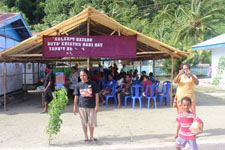 The community projects that you will be involved with have been designed by Barefoot Conservation, in conjunction with the local community and government. Through regular meetings between Barefoot Conservation and local stakeholders, including government, elders, women, school groups, fisherman, farmers, and many others, community projects are designed to meet urgent and long-term needs, while fulfilling the goals of the expedition, which include:
The community projects that you will be involved with have been designed by Barefoot Conservation, in conjunction with the local community and government. Through regular meetings between Barefoot Conservation and local stakeholders, including government, elders, women, school groups, fisherman, farmers, and many others, community projects are designed to meet urgent and long-term needs, while fulfilling the goals of the expedition, which include:
- Undertake educational programmes on environmental issues, sustainable fishing techniques and the economic benefits of marine protected areas.
- Increase quality of life and alleviate poverty in local communities.
- Encourage entrepreneurial attitudes to deter from unsustainable destructive activities like shark finning or dynamite fishing.
- Research the effects of Climate Change on coastal communities.
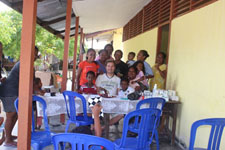 These projects are entirely funded by the fee that volunteers pay, and will cover a wide range of issues that the local community is facing. Some will be urgently needed and others may be more long term educational or quality of life issues. The progress of these projects will be monitored and evaluated over time to demonstrate how they contribute to the greater goals of both the local community and Barefoot Conservation. This will allow us to scale up projects that are having the biggest impact and to re-evaluate and redesign the less effective ones.
These projects are entirely funded by the fee that volunteers pay, and will cover a wide range of issues that the local community is facing. Some will be urgently needed and others may be more long term educational or quality of life issues. The progress of these projects will be monitored and evaluated over time to demonstrate how they contribute to the greater goals of both the local community and Barefoot Conservation. This will allow us to scale up projects that are having the biggest impact and to re-evaluate and redesign the less effective ones.
These projects will evolve over time as certain needs are met and others arise. As we grow as an organisation, we hope to expand our work from the island of Mansoear into neighbouring communities.
Volunteers could be involved with teaching English to the school children  and other community members, river and beach clean ups, our renewable energy programme, climate change research, livelihood diversification workshops, our community medical clinic and providing education on environmental issues and eco-tourism to name but a few.
and other community members, river and beach clean ups, our renewable energy programme, climate change research, livelihood diversification workshops, our community medical clinic and providing education on environmental issues and eco-tourism to name but a few.
Crystal clear waters off the basecamp...These amazingly clear waters make visibility when diving perfect, allowing you to never miss a thing.
I actually did my first ever dive whilst on a coral reef conservation project, and I’ve been hooked ever since! Waking up every morning to go diving in crystal blue waters was just incredible. I made such fantastic friends with the other guys on the team!
Raja Ampat
Raja Ampat loosely translates to mean "Four Kings", and is an archipelago in the East of Indonesia made up of 1500 small islands and cays surrounding the main four islands (or Four Kings) of Misool, Salawati, Batanta and Waigeo. The Raja Ampat Regency covers over 40,000 Sq Km of land and sea, including the largest national marine reserve in Indonesia; "Cenderawasih Bay". The Regency is part of the new West Papua province which was formerly know as Irian Jaya. The capital of the regency is Waisai (est. population 6000) which is located on Waigeo and is only a 45 minute boat ride from our island/project site.

Raja Ampat sits right in the heart of the "Coral Triangle", which is unquestionably the most bio-diverse area for marine life in the world.
Incredibly, the oceans that surround Raja Ampat contain 80% of all the world's coral species (10 times the number of species found in the entire Caribbean!), 1350 species of fish, 6 of the world's 7 marine turtle species and 27 varieties of marine mammal.
With so many of the 1500 small islands, cays and reefs still to be mapped and discovered, Raja Ampat truly is one of the "worlds" final diving frontiers!
![]()
Project Summary & Goals
Summary:
Barefoot Conservation is working in partnership with the Raja Ampat local government, local Papuan Communities and stakeholders, to protect the coral reefs of Raja Ampat and the communities that rely on them.
This partnership is bonded by a willingness to make a real difference, and the understanding that research, survey dives and Marine Protected Areas cannot work unless accompanied by education and the sustained alleviation of poverty.
The Raja Ampat project is designed to work at a grass roots level, thus making a real difference to real people, and a difference that each volunteer can see and be a part of.
Goals:
- To conduct marine underwater surveys using the Reef Check methodology, collecting data, for the use in advising local government, local communities and other NGO partners, on the health of coral reefs and the marine life in Raja Ampats Marine Protected Areas (MPA's).
- Produce a local Manta Ray Identification (ID) database, through underwater manta ray surveys. Sharing collected data with local government and NGO partners.
- Monitor the number of Crown of Thorns Starfish (COT's) in the region, undertaking COTs survey/removal dives during large outbreaks.
- Undertake educational programmes on environmental issues, sustainable fishing techniques (if necessary) and the economic benefits of MPA's.
- Increase quality of life and alleviate poverty in local communities, through our community projects - Education, Waste Management, Health Clinics, Family Planning, Dental Hygiene and Renewable Energy.
- Encourage entrepreneurial attitudes to deter from unsustainable destructive activities like shark finning or dynamite fishing.
![]()
Insurance
You will need both scuba diving and travel insurance that covers you for the duration of your expedition and for scuba diving up to 30 meters. IF YOU DO NOT HAVE ADEQUATE SCUBA DIVING INSURANCE YOU WILL NOT BE ALLOWED ON THE EXPEDITION. You must send us copies of your insurance certificates and policies before you join the expedition.
We strongly recommend you use Divers Alert Network (DAN) for your insurance as they are by far the best and most reasonably priced. Please visit www.diversalertnetwork.org for further details.
![]()
Visas, Passport & Vaccinations
Most nationalities will need a Visa when entering Indonesia. Please note in most cases a Visa On Arrival (VOA) can be obtained at the airport for US$35 (approximately £21, $37 AUD) or can be purchased before departure. The VOA is for a total duration of 30 days only and can only be extended once in country, for another 30 days (approximate cost £35, US$58 or AUD$62). If you are joining an expedition for more than 8 weeks we recommend you purchase a 60 day social visa from the Indonesian embassy in your country before joining the expedition. Please contact one of our helpful trip advisers before applying for this visa, as we can provide you with all necessary forms, documents and information to process the application.
You can now also apply for a eVOA online before arrival, via this official Indonesian immigration website: https://molina.imigrasi.go.id/
You MUST have 6 months validity left on your passport when entering Indonesia.
For vaccinations it is important that you consult with your local physician 4-8 weeks before joining the expedition. This is so you can get up-to-date information on vaccinations and general health concerns when travelling to East Indonesia.
While the site does not generally have a major issue with mosquito's (due to the beach front location and cool breeze), we still recommend you take precautions against Malaria. However we do not recommend you take Lariam (mefloquine) tablets as these can have side effects that could be mistaken for Decompression Sickness.
Please remember you are travelling to a remote tropical island in a remote part of the world. As Indonesia is a tropical country the risk of tropical virus's is higher, than in other countries.
In all cases please consult your local physician for up-to-date medication advice.
![]()
Getting There
The main airport used to get to Raja Ampat is "Sorong" on the western tip of Papua, this area is extremely safe, is very well built up and set up for tourism. The best way to get to Sorong is:-
"Jakarta to Sorong to Raja Ampat"
You can fly from Jakarta, the capital of Indonesia to Sorong . As all internal flight to Sorong leave early morning we recommend you look for flights that arrive in Jakarta around late evening (7pm) the day before your expedition start date. This way you will spend less time in transit at Jakarta airport. Operators that fly to Sorong from Jakarta are: AirAsia, Lion Air, Batik Air, Sriwijaya and Garuda Air. (all have stopovers in either Makassar, Ambon or Manado, accept AirAsia and Batik Air which are the only airlines to currently fly direct). We recommend using the flight booking site Skyscanner, and highly recommend arriving the day before your expedition start date if possible.
The meeting point on your expedition start date is the Fave hotel which is very close to the airport (5 minute taxi ride) where you can relax in the hotel lobby or restaurant while you wait for the 9am ferry to depart for Waisai the capital of Raja Ampat. A Barefoot representative will collect you from the Fave Hotel at 08:00 to take you to the ferry port, where your catch the ferry (approx 2 hours) to Waisai. Our boat will meet you on arrival in Waisai and take you on the final 90 minute boat ride to your home for the duration of your expedition. NOTE: If you are already travelling in Indonesia before your expedition or travelling in Singapore please contact us for alternative ways to get to Sorong if you do not wish to fly from Jakarta.
“Raja Ampat to Sorong to Jakarta”
On the day of your departure from the expedition, our boat will depart basecamp at 07:15 to take you back to Waisai, where the ferry to Sorong leaves at 9am. You will arrive in Sorong approx 2.5 hours later, around 11:30am, and may need to stay one night in a hotel in Sorong as there are limited flights departing Sorong airport in the afternoon. Most flights from Sorong to Jakarta leave in the morning/early afternoon and arrive in Jakarta late morning/midday. From here you can transfer from the domestic terminal to the international terminal to wait for your connecting international flight home.
**Barefoot Conservation can help advise you on domestic flights to/from Sorong**
Barefoot Conservation can also advise you on international flight bookings, so please do not hesitate to contact us when booking flights.
![]()
Expedition Staff
Our expedition staff are made up of both overseas volunteers and paid local community members. The staff are there for your health & safety and to help guide you in getting the best possible experience from your time with us. At Barefoot Conservation we feel it is very important we all work together as a team to achieve our goals, and that mutual respect is shown to each other at all time. No matter what your age or experience in life, everyone's opinions are valid and listened to by our dedicated staff members, so please never feel afraid to discuss any issues/concerns or opinions with our expedition staff.
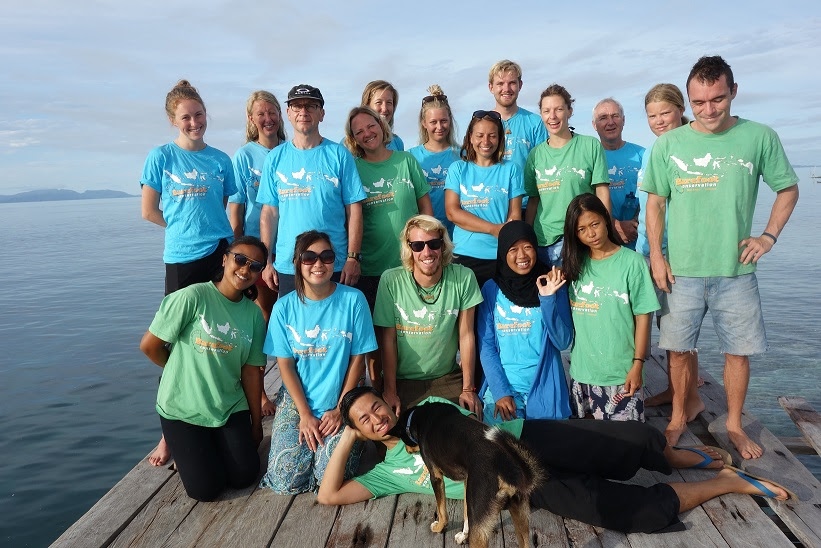
Expedition Staff :
- Project Site Manager/Expedition Leader (PSM/EL)In charge of managing all on site personnel and holds overall responsibility for managing the expedition, including the smooth running of the day-to-day activities and ensuring key targets/goals are met.
- Project Scientist (PS)Responsible for designing, planning and co-ordinating the science programmes. Communicating all science related data to local government, project partners and local community. In charge of all SO's and deputises for the EL when needed.
- Scuba Instructor (SI)Responsible for teaching all PADI Scuba courses to volunteers and staff. Planning, organising and overseeing all day-to-day diving activates, including all diving related health & safety.
- Medical Officer (MO)Has the overall responsibility of providing medical support to all on-site personnel. Maintaining all medical equipment and supplies. Please note it is not always possible to have a MO on site, however during this time there is a local nurse on the island, we have doctors available to call, and the local hospital is 45 minutes away by fast speed boat. When possible we always try to have a MO on site, but there may be times when a MO is not on the project.
- Science Officer (SO)Works under the supervision of the PS and has the responsibility of running the science programme on a day-to-day basis, including presentations and in-water spot dives. Ensures all survey dives are well planned, run smoothly and that all the daily data is collated correctly.
- Community Officer (CO)Liaises between the expedition team and the local community. Responsible for co-ordinating the days community projects for volunteers and reports directly to the Country Manager and EL.
- Boat Captain (BC)Responsible for driving the boat safely to/from survey dive sites. Maintains and services the boat/engine, and oversees all personnel safety while on the boat.
- Dive Guide (DG)Works with the BC and SO to determine which survey sites to visit that day. Provides guidance and advice on the boat and is responsible (along with the BC) for the survey teams safety.
- Master Chef (MC)Responsible for providing amazing meals every day (except Sundays), which keep the expedition team going and full of energy.
![]()
Accommodation & Food
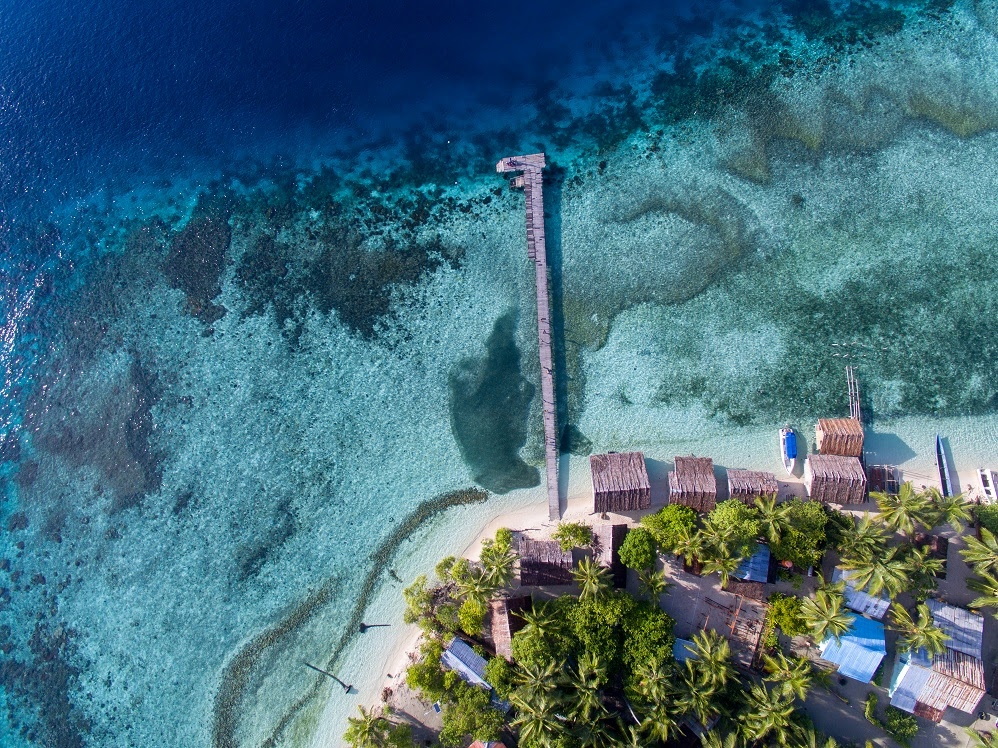
Accommodation is provided on our amazing beach-front location on Arborek Island, just meters from the calm, crystal clear ocean and comprises basic dormitory style beach bungalows, and two private beach bungalows (extra rental cost applies).

Each bungalow has been hand built by the local community using traditional methods and materials. You will be provided with a bunk bed, mattress, pillow, basic linen (you may wish to bring a light sleeping bag) and mosquito net, along with a fan for each room. The bungalows are same gender and have power supply so you can recharge cameras, tablets and phones.

**Please note accommodation is in basic shared beach bungalows, and is not of a 5 star luxury resort!**
The project site has western style toilets and limited fresh water to shower/wash in. While the island does have water wells, these are now getting increasing salty, so currently our fresh water comes from our desalination machine or from Waisai each Wednesday, while we find a solution to the communities/islands fresh water supply issue. Due to this and because we are a conservation project on a tropical island so we may at times limit the amount of shower time.
We provide 3 meals a day (specific dietary needs can catered for). These meals are at fixed times during the day, so that the day's dive surveying and community projects can be effectively managed. Meals are based upon local cuisine and seasonal availability of locally produced food. Meals are prepared and cooked by local staff, except on Sundays when expedition staff & volunteers will prepare and cook all meals.
While we will endeavor to provide a balanced diet of fresh fruit and vegetables during your expedition, you may wish to consider bringing a supply of vitamin supplements.
Volunteers with specific dietary requirements will be catered for, please indicate these requirements on your booking form.
![]()
Communications
At present only one local network provider (Telkomsel) has coverage/reception in the Raja Ampat region. If you really do want to stay in touch with the outside world, it is possible to purchase a Telkomsel SIM card (Jakarta Airport or Sorong city) and use it in your mobile phone while on site *YOU MUST REGISTER YOUR PHONE ON ARRIVAL AT JAKARTA AIRPORT*. The basecamp on Arborek has pretty good reception now as a new mobile tower was recently built on the island. Some overseas mobile phones may work if set to roaming but please check with your network service provider before joining the expedition. Calls/texts may well be cheaper from a local SIM card.
Smartphones can receive 3G/4G for use with internet, and our staff can help you purchase phone credit and data packages.
No mobile phones are permitted during Scuba/Science lectures or while attending any community projects.
![]()
Day-to-Day Expedition Life
Your typical day will consist of 2 survey dives and time spent on various community projects in the local community. At Barefoot Conservation we believe it is vital to work in the community, educating, improving equality of life and alleviating poverty, alongside producing a detailed habit map of the surrounding coral reef/marine life that the community rely so heavily on.
Breakfast will be served at 7am and depending on the weather, and advice from our local dive guides/boat crew, you will either start your first survey dive of the day at 9am or visit the local community to assist on various community projects which the Community Officer will organise.
At the end of each survey dive you will relay the data from your dive slates on to the data recording sheets, for later entry into our database.
After lunch (12:00-12:30) you will do the opposite of what you did in the morning, so if you worked on community projects in the morning, your undertake survey dives in the afternoon and vice versa.
Dinner is served at 19:00 and, after a short de-brief session on the days activities, the evening is yours to relax, have a cold beer and talk about the amazing marine life you saw or the kind villagers you made friends with, while watching the sunset off Barefoot jetty.

Some evenings may involve an advanced presentation or Indonesian language lessons for those interested and theory sessions for volunteers taking extra PADI scuba courses.
Monday to Friday are reserved for survey dives and Community project work.
Saturday is for fun dives where the Barefoot dive profiles are relaxed slightly, and dive computers can be used for multi-level divers, that are deeper and longer.
Wednesday mornings the team goes to Waisai the capital of Raja Ampat to collect/drop off volunteers and pick up supplies. Volunteers can join this trip to use the internet and buy any extra luxury items in Waisai. Please be aware that the capital only has a population of 6000 and hence is still small, so it does not have hundreds of shops.
Sunday is a complete NO dive day, this is for health & safety reasons and gives your body time to recover from the weeks diving. This gives you some valuable downtime when you can sunbath, play volleyball or football, go for a swim/snorkel, read a book, go for a walk around the island, watch a movie or visit the local village.
Saturdays & Sundays may be used by the SI when teaching extra PADI Scuba courses, however only confined diving (no deeper than 5 meters) can be undertaken on the Sunday.
NOTE* The above typical day is open to flexibility; the day may not always be as above due to logistical reasons or situations out of our control (bad weather, public holidays, local community ceremonies etc..). The morning survey dives may be at a far away dive site and thus breakfast may be served earlier. Or the local village may be off limits for the day due to private religious ceremonies. When ever possible Barefoot will try to stick to the typical day plan, however a certain amount of flexibility and understanding is needed from all expedition personnel.
![]()
Scuba Diving
Unqualified Scuba Divers:
If you join an expedition as an unqualified diver you will take part in the Dive Training Program (DTP) and be a Dive Trainee (DT). This will take part during the first week of the expedition and will involve being trained first as a PADI Open water (OW) diver, and then as a PADI Advanced Open Water (AOW) diver. Our fully qualified PADI Scuba Instructor will guide you through the dive theory, then confined water sessions (no deeper than 5 meters), and then, once you are comfortable, on to the open water sessions where your dive to no deeper than 18 meters.
The AOW course does not involve as much theory work as the OW course, and is more about reinforcing what you have already learnt, by undertaking 5 dives. A "Deep" dive (max 30 meters) and a "Navigational" dive are mandatory as part of the PADI AOW course, however, as you will be doing coral reef surveys, it is vital your buoyancy is good and hence we also make the "Peak Performance Buoyancy" dive mandatory as well.
For your safety, and that of the other divers on the survey team, DT's will not be allowed to take part in survey dives until they have passed the OW and AOW courses to the satisfaction of the PADI Scuba Instructor teaching them.
NOTE* Volunteers joining as a Dive Trainee will have to provide their own PADI OW and AOW eLearning (online manuals) for each course undertaken. PADI have now made it mandatory for each student to have there own set of manuals/eLearning for each course. We can help you purchase the eLearning (comes with PADI certification) for your courses.
NOTE* During peak volunteer times DT's may need to share these BCD's, Regulators and some other rental equipment with other volunteers.
Qualified Scuba Divers:
If you are joining an expedition as a PADI AOW qualified scuba diver, or equivalent level with another organisation (see comparison table), your expedition will start a week later than the Dive Trainees taking part in the DTP. It is important that you send our UK office (via email) a copy of your scuba diving qualification card and log book detailing when your last scuba dive was before your expedition start date. You must also take this qualification card and log book to the expedition with you for the on-site PADI Scuba Instructor to verify.
For your safety and that of your fellow divers, all qualified divers joining an expedition must undertake a review dive with the PADI Scuba Instructor to demonstrate their dive skills, show they have the necessary neutral buoyancy skills to undertake survey dives and prove they do not pose a safety risk to themselves and/or others.
Qualified divers will not be allowed to take part in survey dives until they have passed this scuba review dive to the satisfaction of the on-site PADI Scuba Instructor.
NOTE* You will not be allowed to take part in survey dives until you have passed this scuba review dive to the satisfaction on the PADI Scuba Instructor.
NOTE* All qualified scuba divers joining an expedition must provide all their own diving equipment (BCD, Regulator, Dive Computer, Mask, Fins, Wetsuit, Booties, Delayed SMB, Reef hook etc..). Most of these items can also be rented from Barefoot Conservation. Please see our "costs & dates" for more details and for the rental costs.
All volunteers:
As Barefoot Conservation's priority is your safety at all times we maintain a high level of diving standards and strict dive profiles. The Barefoot Conservation dive profiles are more conservative than the recreational dive tables other scuba diving centers may use.
This is due to the amount of diving volunteers will be undertaking each week and to greatly reduce the risk of a diving incident.
It is the responsibility of the volunteer to present themselves fit for diving (i.e. well rested, well hydrated with no pre-existing injuries or illnesses). If volunteers have any doubt as to their fitness to dive they must refer themselves to the Medical Officer (MO), when one is available.
If volunteers are proven to have misled Barefoot Conservation, or its appointed MO regarding medical issues, they will not be allowed to dive until cleared to by Barefoot Conservation head office and on-site MO. If an individual has willfully misled any of the above they may be dismissed from the project.
The MO’s decision on an individual’s medical suitability to dive is final once confirmation from Barefoot Conservation head office is obtained.
Cave diving, cavern diving, wreck penetration or any other form of diving presenting a ‘no clear surface’ environment is not permitted at any time.
*IMPORTANT*
All volunteers MUST read the Barefoot Conservation "Dive Profiles and Standards" document before joining an expedition.
![]()
Community Projects
The community projects that you will be involved with have been designed by Barefoot Conservation's "Community Team", in conjunction with the local community and government. Through regular meetings with the local community, local government and the Community Team, community projects are created which are designed to meet urgent needs and the goals of the expedition mentioned under the "Project Summary & Goals" section of this guide.
These projects will cover a wide range of issues the local community are facing. Some will be urgently needed and others may be more long term educational or quality of life issues.
Volunteers could be involved with teaching English to the school children and other community members, beach clean ups, our renewable energy programme, climate change research, our community medical clinic, kids dental hygiene and providing education on environmental issues and eco-tourism to name but a few.

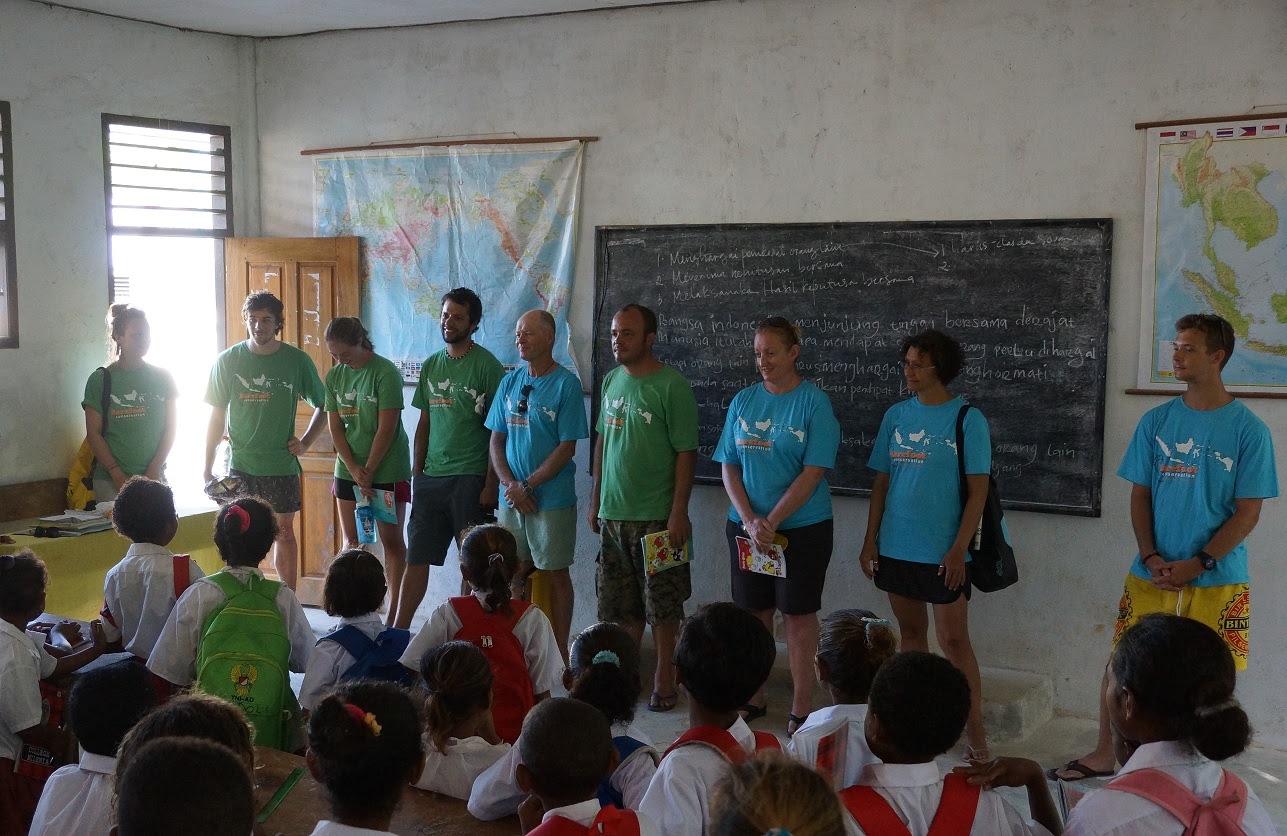
![]()
Social Life
Barefoot Conservation is run and owned by ex-expedition volunteers so we understand that volunteering for an expedition is not just about the amazing survey dives and making a real difference in the local community, its also about the friends you make, who, more often than not, become friends for life.
That is why we encourage a good social life while on expeditions; fancy dress parties, murder mystery nights, social events, evening games, movie nights, volley ball competitions and a few cold beers on a Saturday night are all part of that.

![]()
Local Cultures & Customs
Barefoot Conservation relies heavily on the relationship between us, the local community and the government of the host country our projects are based in. We are merely guests in their county and, as such, all expedition volunteers and staff must act accordingly. When you join a Barefoot expedition you become part of the larger Barefoot community. You are the face of Barefoot Conservation and hence you must be aware of and respect all local cultures and customs.

All expedition volunteers/staff are briefed by the EL & CM on arrival, regarding the local cultures and customs you need to be aware of and respect while on the expedition. We also recommend you brush up on Indonesian/West Papua local cultures and customs before your expedition. Specific country travel guides or internet searches are a good way to do this.
![]()
Equipment
Diving Equipment:
All volunteers joining our expedition as a non-diver or a qualified diver, must bring the follow diving equipment: BCD, Regulator set, mask, wetsuit, fins, dive boots, and a dive computer. Dont worry if you do not have these items or you do not wish to carry them around, while on further travels, as it is possible to rent these items from us. Please see our "costs & dates" page for further details, or contact one of our operations team. *NOTE during busy periods equipment may need to be shared between volunteers/staff.
All volunteers will be provided with tank, weights and weight belt as part of your expedition fee. Other items that volunteers need to bring are a dive slate, torch and reef hook. Please check the equipment list sent to you in your welcome email, for a full list of what to bring.
![]()
Personal Expenditure
Over the course of a Barefoot Conservation expedition volunteers will require funds for in-transit expenses and personal expenditure, such as bar refreshments, luxury items from the capital etc. A budget of approx. £185 to cover in-transit expenses to/from the expedition base, and a budget of approx £150 per month for personal expenditure during the course of your expedition is usually adequate. A rough guide to help you plan personal expenditure whilst in-transit to/from the expedition and during the course of their expedition is given below:
The exchange rate for the Indonesian Rupiah (IDR) fluctuates so please check current rates before leaving.
Outgoing Journey Personal Expenditure
- Visa on Arrival - $35 US dollar and $35 for a 30 day extension if needed.
- Any Excess Baggage - 24,500 IDR (approximate)per kilo over the Maximum 20 kilo allowance (20kg for Lion Air, 10kg for Wings Air)
- Taxi Sorong Airport to Hotel - 50,000 to 100,000 IDR
- Taxi Fave Hotel to Ferry port Sorong - Free (included in Expedition Fee if arriving on designated expedition start dates)
- Accommodation Sorong - 500,000 IDR (250,000 IDR each if sharing twin room) (Breakfast included)
- Evening meal - 50,000-100,000 IDR
-
Ferry Sorong to Waisai (Raja Ampat capital) - 150,000 IDR
-
Raja Ampat Marine Park Fee - 1,000,000 IDR
On-site Personal Expenditure
- Personal expenses per month (bar refreshments, luxury items etc..) - 2,000,000 IDR - 3,000,000 IDR
- Visa extensions if needed - 500,000 IDR (per 1 month extension for VOA), 500,000 IDR (for Social visa extensions).
- Extra optional PADI dive courses - Rescue Course £220 - Divemaster course £370
- Any ad-hoc scuba equipment rental not pre-arrange - See "Costs & Dates" for prices
Return Journey Personal Expenditure
- Ferry Waisai to Sorong - 150,000 IDR
- Taxi from port to hotel - 100,000 IDR (can be split between several volunteers)
- Accommodation Sorong- 500,000 IDR (250,000 IDR each if sharing twin room) (Breakfast included)
- Meals - 50,000 - 100,000 IDR
- Taxi hotel to Sorong aiport - 100,000 IDR (can be split between several volunteers)
- Excess Baggage - 24,500 IDR per kilo over the Maximum 20 kilo allowance (15kg for Lion Air, 10kg for Wings Air)
We recommend you bring the majority of your money in Indonesian Rupiah with some US$ Dollars as a backup for emergencies (approx US$100). The best chance to get any money out from an ATM is in Sorong. Waisai does now have some ATM's, however not all international bank cards work. Travelers cheques are not recommended.
Important - While there are new ATM machines in Waisai (where we go every Wednesday for supplies), some foreign ATM cards do not work with them. This means there may not be another opportunity to make further currency exchanges or ATM withdrawals until you return to Sorong at the end of your expedition.
Volunteers should therefore consider carefully how much foreign currency they plan to carry as cash for the duration of their expedition.
Barefoot Conservation also recommends that volunteers bring a credit card for emergency use as many insurance companies will not pay for bills upfront and so initial payments may be needed.
![]()
The best way to get to Raja Ampat is from Jakarta the capital of Indonesia. Once you have taken your international flight to Jakarta, you will need to take an internal domestic flight to Sorong on West Papua. This is the closest airport to Raja Ampat and operators that fly there are: Lion Air , Sriwijaya Air, Garuda Air and Batik Air.
Volunteers MUST be in Sorong of the morning of there expedition start date, though we recommend you arrive the day before. The meeting point on the start date of your expedition is the Darefan Hotel close to the airport. The ferry to Waisai the capital of Raja Ampat leaves Sorong at 9am . A Barefoot staff member or representative will collect you at 8am from the lobby of the Darefan hotel and take you to the ferry, with takes approx 2 hours to get to Waisai. Our boat will meet you on arrival in Waisai and take you on the final 40-60 minute boat ride to your home for the duration of your expedition.
Barefoot Conservation can help you with all internal flight bookings, and advise on international flights. Please do not hesitate to contact us when booking both international and domestic flights.
Yes. Most nationalities will need a Visa when entering Indonesia. Please note in most cases a Visa On Arrival (VOA) can be obtained at the airport for US$35 (approximately £25, $50 AUD) or can be purchased in your home country before departure. The VOA is for a total duration of 30 days only and can only be extended once in country, for another 30 days (approximate cost US$60 or £40). If you are joining an expedition for more than 30 days we recommend you purchase a 60 day tourist visa or 60 day social visa from the Indonesian embassy in your country. Please contact one of our helpful trip advisers before applying for this visa, as we can provide you with all necessary forms and information to process the application.
*Please note there is now a FREE 30 day visa on arrival option for most countries. This visa however can NOT be extended when in Indonesia. Please check you local Indonesian embassy to see if your country is on the list.
You will need both scuba diving and travel insurance that covers you for the duration of your expedition and for scuba diving up to 30 meters. IF YOU DO NOT HAVE ADEQUATE SCUBA DIVING INSURANCE YOU WILL NOT BE ALLOWED ON THE EXPEDITION.
We strongly recommend you use Divers Alert Network (DAN) for your insurance as they are by far the best and most reasonably priced. Please visit www.diversalertnetwork.org for further details.
It is important that you consult with your local physician 4-8 weeks before joining the expedition. This is so you can get up to date information on vaccinations and general health concerns when travelling to East Indonesia. In general you will need to make sure the following vaccinations are up to date: Hepatitis A, Hepatitis B, Typhoid, Polio, Japanese Encephalitis, Rabies and Tetanus-Diphtheria.
While the site does not generally have a major issue with mosquito's (due to the beach front location and cool breeze), we still recommend you take precautions against Malaria. However we do not recommend you take Lariam (mefloquine) tablets as these can have side effects that could be mistaken for Decompression Sickness.
In all cases please consult your local physician for up to date medication advice.
The temperature is around 27-30°C all year round. Generally the coastal regions are hot and muggy, but the project site has a nice cool breeze on one side and is protected on the other. The most rain falls between May and September, however most spells are short and never for more than a few days at a time.
One of the beauties of Raja Ampat and our project site is the remoteness and the feeling of getting away from it all. However there is one local mobile phone operator that does have coverage in the region. At present only Telkomsel has reception in our area, so if you really do want to be contacted it is possible to purchase Telkomsel SIM cards and use them in your mobile phones while on site.
There is limited 2G internet access at the basecamp via smart phones. Volunteers have been able to access emails, Skype, Whatsapp, BBM, and even book flights and do online banking, through their smart phones and Waisai now has 3G. Please remember how remote the island is, and that patience is needed when trying to get online.
At the Expedition Leaders discretion it is possible to go to the capital to use the internet on Wednesdays when we are collecting volunteers or supplies.
No mobile phones are permitted during Scuba/Science lectures or while attending any community projects.
The science team at Barefoot Conservation has put together a detailed science program for you to undertake. You will learn key fish families/species, corals, invertebrate and plant life. Our science team will teach you how to identify these, first through classroom presentations and then through in-water spot dives. Following these presentations/dives there will be tests (both classroom and in-water) on each of the above sections.
You will also learn all about Manta Rays and how to monitor them, thanks to the Aquatic Alliance our new partner in our Manta Ray Research Programme.
There will also be advanced science presentations on various subjects for those who wish to attend.
We make your safety our top priority, so for these reasons you will need to pass the scuba diving tests for PADI Open Water and Advance Open Water before we let you go on survey dives.
It is also very important that the data you collect from these survey dives is accurate. This data will be used to show the health of the reef to local government, project partners and the local community. It will also be used to suggest best practices for the community and government, to maintain a healthy coral reef and ecosystem for the future. Therefore you must also pass the relevant science tests to ensure you have the knowledge and skills to collect accurate data.
There will be in-water tests as well as class room ones, on identifying fish families/species, Corals, Inverts and Plant Life.
At Barefoot Conservation we put a lot of focus on working with the community and making them a big part of our work; after all we are only visitors in their home.
Our Community Manager, together with the Community Officer, will work with the local government and community to discuss, create and manage suitable community projects. These are projects where all parties feel your help and money is needed the most. These projects could range from providing clean water, renewable energy, waste management, English lessons and providing medical healthcare/treatments.
You will be involved in providing education to all local communities, about the importance of sustainable non-destructive fishing techniques.
Other major projects you will be involved in are, encouraging entrepreneurship and educating/preparing the communities for ecotourism and globalisation.
Raja Ampat is in the far east of Indonesia, off West Papua. The region is made up of some 617 paradise islands, many of which are still waiting to be discovered and have coral reefs that have NEVER been dived.
Simply drop us a call or email, which you can find on the "contact us" page, and one of our helpful trip adviser's will guide you through what you need to do to reserve your place on the project.
We recommend a minimum of 4-6 weeks to really get the most out of your experience. The scuba diving and science training normally takes between 2-3 weeks, so it is not until the 4th week that you really get your teeth into the survey diving and community work. However, we understand that not everyone can come for this amount of time due to work commitments or other. So we have devised a shorter program for those who are already qualified divers and only have 2-3 weeks available. These places on the project are limited, so make sure you book early. Volunteers can also extend their stay while on the project from week to week. The longer you stay the cheaper it becomes!
Due to logistical reasons the start dates for the projects are set through out the year. We provide scuba diving and science training with in the first 3 weeks, for which all long-term volunteers need to be present. However, if you would like to attend our 2-3 week special shortened program these dates are a little more flexible. Please contact one of our helpful trip advisers for more details. For all expedition dates through out 2013/14 please see our "costs & dates" page.
Please see our "costs & dates" page for exact details on how much it costs to join an expedition and what is/is not included in the expedition fee.
The majority of the money you paid will go to the day to day running of the project you are on, accommodation, food, fuel and local staff wages. A proportion of it will also go to the community projects you're involved in while on the expedition. So your money may help buy new school books for the local children, building materials for the new community center or vaccinations to protect the villagers against many otherwise deadly diseases.
At Barefoot Conservation we are a true believer in transparency. We want you to know that your money is going directly to the people that need it and that you really are making a difference.
While all necessities are provided in the price of the expedition, there are opportunities to purchase the odd luxury like a cold beer or coke to help watch the amazing sunset. The local village also has a small shop where you can buy other goodies like sweets.You may also decide you wish to undertake further scuba diving courses, such as Rescue Diver and Dive Master. Please see the "costs & dates" page for further details on these courses.
Due to safety and logistical reasons it is not always possible for you to come and go from the site when you please (unless for medical or visa extension reasons). However, there may be opportunities to go to the capital Waisai on Wednesdays (90 minutes by speed boat) should a member of staff need to go there. We understand that, when on a remote expedition some mild cabin fever can set in. So, when possible, the expedition staff will try to arrange trips to the capital or off site to other locations. Local boats from the village can also easily be arranged should you need to travel to Waisai on a non Wednesday. Please speak to the on-site staff once on the project regarding this, or members of the local community.
If you decide you no longer wish to stay on the project and leave early, please refer to our cancellation policy in our terms and conditions, using this link, for more information on this.
Go to "General FAQ's" Go to "Diving FAQ's"
Barefoot Conservation asks for an up front £200 deposit which is non-refundable in all circumstances. It is also very important that you read and sign the Booking Conditions when you pay your deposit. This will guarantee you a place on the expedition. Volunteers who cancel 4 weeks or less before the start of the project will not be refunded at all. Volunteers who cancel before this date will be dealt with on a case-by-case basis, but in some circumstances it may be possible to re-book for another date/expedition. In the unlikely event that you are not able to attend an expedition and you have already paid your balance, your travel insurance company should be able to offer you a refund. Please check your policy for more details. Once a volunteer has joined the project, there is no refund option available., should they decide to leave early. Because of our strict cancellation polices, we highly recommend volunteers take out trip cancellation insurance.
Go to "Project FAQ's" Go to "Diving FAQ's"
No previous experience is needed. Dive courses are conducted in the first week of your expedition. You can also take additional PADI dive courses like Rescue and Divemaster whilst on the project. Please see our "costs & dates" page for more details on additional courses.
All volunteers joining our expedition's as a non-diver or a qualified diver, must bring the follow diving equipment: BCD, Regulator set, mask, wetsuit, fins, dive boots, a dive computer, reef hook, torch and delayed SMB. Dont worry if you do not have these items or you do not wish to carry them around, while on further travels, as it is possible for you to rent your BCD, Regulator, Wetsuit, Fins, Mask & Dive Computer from us (we do not have reef hooks, torches or delayed SMBs for rent). Please see our "costs & dates" page for further details, or contact one of our helpful trip advisers.
All volunteers will be provided with a tank, weights and weight belt as part of your expedition fee.
YES - This is extremely important, you will not be allowed on the expedition with out adequate insurance that covers you for diving up to 30 meters and for the duration of your stay. We strongly recommend you use Divers Alert Network (DAN) for your insurance as they are by far the best and most reasonably priced. Please visit www.diversalertnetwork.org for further details.
Raja Ampat has over 80% of the world's hard corals and is one of the most bio-diverse areas in the world due to currents from different oceans flowing into the region. This means that at times there may be small, mild currents on some of the dives. However, you will be fully trained on how to dive in currents and will not be expected to go out on surveys until you are totally confident and have good buoyancy skills. Experienced divers may wish to bring a reef hook, and delayed SMB (though these are also provided on site).
We have some of the best boat drivers in the area. They were born in the local villages and know the curents on dive sites very well. Their local knowledge (some of which has been passed down from generation to generation), is second to none. We also use tide apps on smart phones to determine when it is best to dive a site, to avoid strong currents ie: rising, slack or falling tides.
At Barefoot Conservation safety is our top priority. We have all state of the art medical equipment for remote diving; including oxygen, first aid kits, AED and when possible a Medical Officer on site. The local government installed a new Decompression Chamber in the capital's (Waisai) hospital in 2013. This means the nearest Decompression Chamber to our basecamp is only a 45 minute fast boat ride away.
We require all divers to be qualified to a PADI Advanced Open Water level or equivalent from another organisation. Please see this "comparison table" if your qualification is from another organisation. If you are joining an expedition as a non-diver, your expedition fee includes us training you up to PADI Advanced Open Water and Emergency First Response (EFR - First Aid).
You will typically do 2 dives a day (when possible). Both dives may be done in the morning after breakfast, or both in the afternoon after lunch. This leaves the morning/afternoon available for you to be involved in the community projects and have some downtime. Mon-Fri is reserved for survey dives, while Saturday is for fun dives (recreational), with Sunday being a no dive day (for safety reasons).
We try and do a night dive every 1-2 weeks, this also depends on the tides.
There may be times when it is not possible to do 2 dives a day for example due to extreme weather conditions, equipment issues, village ceremonies, national holidays and other events outside of our control. As we are guests on the island and the local community, we always respect the local communities customs and cultures. We also always put your safety as our top priority, at all times and we will never take unnecessary risks that may jeopardize your health and safety by diving in bad weather/sea conditions!
Please note we make no guarantee of a certain amount of dives per week, and volunteers should be aware they are not joining a dive resort and/or purchasing a dive package.






















